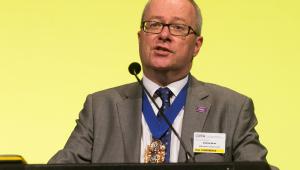18 January 2002
One of the first news stories to seep out this year was the decision of Elizabeth France, Whitehall's information watchdog, to quit her post after clashing with ministers over the implementation of a new law.
France, it was claimed, had come into conflict with the increasingly macho home secretary, David Blunkett, over his new Anti-Terrorism Bill and its freedom of information implications specifically, concerns about new powers being given to the police to spy on e-mails.
Unsure that she would have any say over the implementation of the wide-reaching legislation, France decided to walk, claiming in an e-mail to 300 or so colleagues that she was `very sad to move on'.
She was the third high-profile woman to have left a watchdog post since last summer. Dame Helena Shovelton left the Audit Commission last year when it was evident that she would not be re-appointed as chair. And France's departure has striking similarities with the highly publicised exit of Elizabeth Filkin, the Parliamentary standards commissioner, last December.
Filkin, former wife of Labour local government guru and Best Value architect Lord Geoffrey Filkin, found that if you do your job too effectively, you make enemies. She could never have been a transport minister.
Both France and Filkin discovered that watchdogs have the power to ask questions but only up to a point. Poke your nose too far into the business of government either in Westminster or Whitehall and it is likely to be chopped off. This has prompted some observers to ask: what is the point of watchdogs?
The answer seems to be `not much' while the political class in Westminster remains so resistant to change, argues Patrick Dunleavy, professor of political science and public policy at the London School of Economics.
`The root of the problem in Parliament is specifically Parliament. It is an institution in severe decline. MPs regard themselves as a special class of people not subject to the normal rules of conduct,' he says.
It is because of that decline that there has been such a fuss about Filkin and France, Dunleavy says. Shorn of power and influence, MPs take a stand over such issues simply because they can.
`MPs have very little to do and little impact, so they focus on running their own affairs because that is the one thing they continue to run,' he says. `I think Parliament is essentially an unreformable body and has been for many, many decades.'
It is a bleak view but, given the low regard in which MPs are generally held, it is not an uncommon one.
The few rays of hope that Dunleavy sees within the process emanate from Robin Cook's reform of the Commons, Tony Wright's public administration select committee and the work of `a few' Liberal Democrat MPs.
One of those no doubt is Norman Baker, a former teacher and now MP for Lewes. Baker regularly used Filkin's office to question the conduct of the high and mighty, including Peter Mandelson and Michael Portillo, and claimed France did not receive enough support in official circles.
Baker is `more optimistic than the professor' about the ability of Westminster and Whitehall to police itself effectively. The MP as political eunuch is not a view to which he subscribes.
`Parliament is not unreformable, clearly it could be reformed if there is the political will to do so,' he says. He believes that traces of that political will are already evident.
Even the appointments of Filkin and France showed that ministers started out with the best intentions, he says, even if they shied away from them in the end.
A `change of philosophy' among MPs or a hung Parliament could provide the catalyst for change, says Baker, who shares Dunleavy's optimistic view of the work of Cook and Wright.
But the fact remains that two prominent posts have to be filled. France's position will be advertised in the coming weeks and negotiations are ongoing to replace Filkin.
Baker says whoever steps into the latter post should ensure that the contract does not contain new guidelines that would `undermine' the Parliamentary commissioner role. Even so, the new Filkin will find it hard to convince the public that the job is worth the candle.
The odds against an independent committee being set up to regulate standards in the House seem rather longer than those against the most powerful man in the world being brought down by a pretzel. If so, the role of watchdog will overwhelmingly remain with a vigilant public and media.
PFjan2002


















